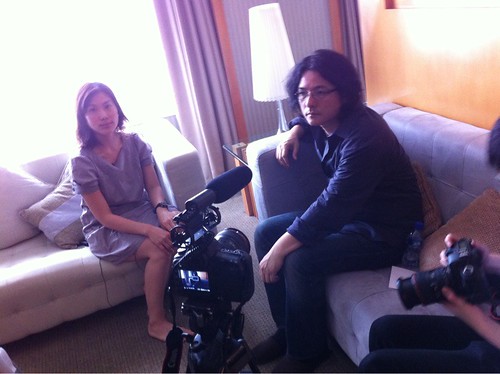
An early phone call from Malaysian filmmaker Tan Chui Mui woke me up this morning. It was 7 in the morning, her assistant passed me stuff before I came to Shanghai so I could pass it to her.
So I met her 20 minutes later for breakfast. She told me she was going to have an interview of sorts for Japanese filmmaker Iwai Shunji's official website.
Like many of my Japanese film lovers of my generation, I was captivated by his works like LOVE LETTER (still a personal all-time favourite) and ALL ABOUT LILY CHOU-CHOU during my youth. I fell in love with LOVE LETTER when I was 13, that was 14 years ago, and my love never wavered. It was through his influences that I make my films that some have considered visually poetic and sensitive.
Thus I followed Mui along for their meeting.
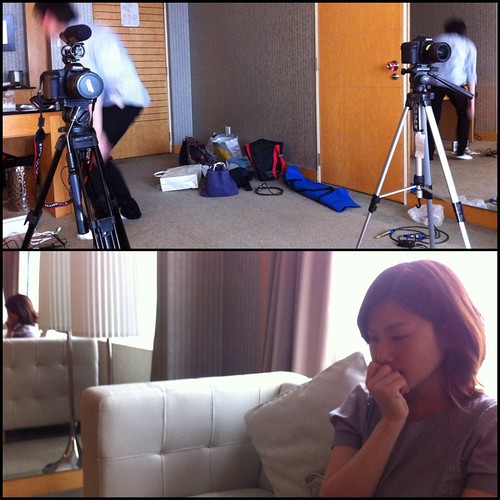
The interview was held in Iwai Shunji's hotel room, with the help of his two assistants Aki and Kai.
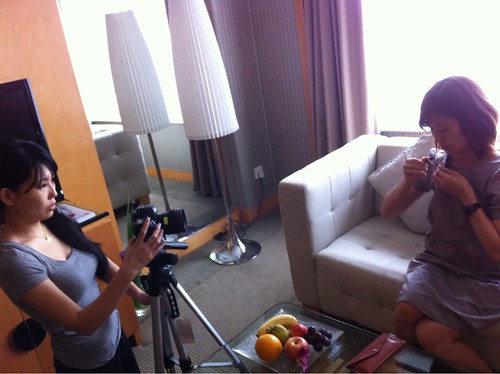
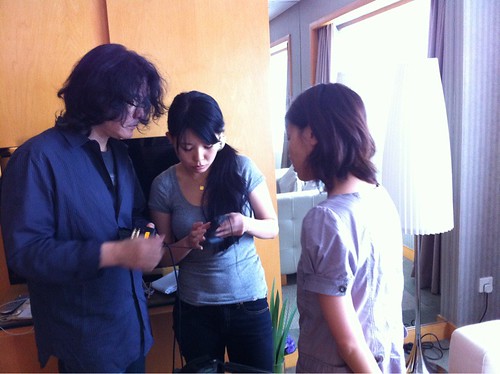
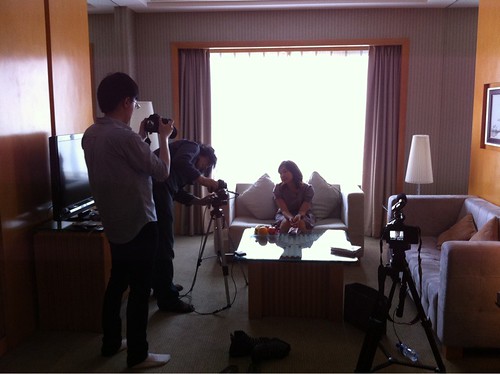
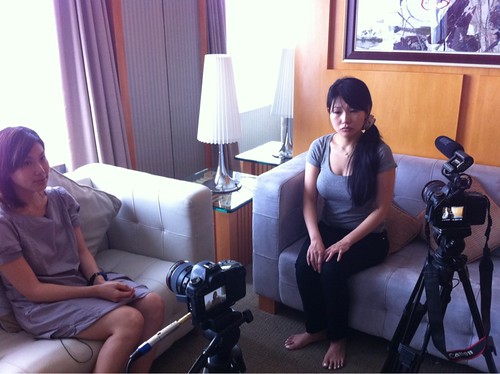
The video conversation lasted for more than an hour, with Iwai asking Mui about Malaysia, its film industry, her own childhood, and how she got into filmmaking.
Mui was a self-taught filmmaker who was at the forefront of the Malaysian New Wave with the likes of Amir Muhammad, James Lee, Ho Yuhang, Woo Ming Jin, the late Yasmin Ahmad etc. during the production of Amir's THE BIG DURIAN.
Because she wasn't formally trained, she believed that the best way to learn was to constantly make films. Back in 2008, after the sheer success of LOVE CONQUERS ALL, her debut feature that won in both Pusan and Rotterdam Film Festivals, she decided to make one short film a month. This lasted for 7 months, the collection of shorts were regarded as ALL MY FAILED ATTEMPTS. One of the shorts EVERYDAY EVERYDAY won the grand prix at Clermont-Ferrand 2008.
I had always agreed with her notion. That's why I tried to be as prolific as I could, though instead of doing a short every month, I could only average one short every 2-3 months since 2008 (well... if I weren't producing and editing two features in this span of time, and flying to a film Fest every other month, I MIGHT work faster)
Iwai pointed out that he had similar background with Mui. When he joined a filmmaking club in university, he was the only one making films (I can relate), it was his method to educate himself as well. Instead of focusing only in directing, he likes all aspects of filmmaking, writing his own scripts, composing his own score etc. A filmmaker worked better if he is familiar with all aspects of filmmaking.
Iwai then went into a sports analogy that as a baseball player, one should learn various positions. Just like how aspiring doctors are taught everything in general at medical school before finding their own specialty. Iwai believes that it is ' good to start with directing and editing as they are the fundamentals of filmmaking'. Hence their experiences in early days are similar.
Since making her sophomore feature THE YEAR WITHOUT SUMMER, Mui had moved to Beijing (she said that 'in the 1920s, artists moved to Paris, in the 1970s, artists moved to New York. And now, Beijing had become the place for artists to go...') and everyday, she had been posting short stories on her Weibo account, the Chinese Twitter without fail.
The process of writing A YEAR WITHOUT SUMMER was difficult, so she needed to ensure that she would have such a writing exercise daily. It was difficult at first, but it had became gradually easier. As making stories on a daily basis had became easier, it would make it easier to write her next screenplays. Everything becomes easier when you constantly try.
I cling to this belief too. That there is no point improving if you don't even attempt to make more films. I always disagreed with friends and acquaintances of mine without any prior filmmaking experience that they could churn out masterpiece without any single attempt at practicing. The world is never fair, but not when it comes to such situations.
Iwai provided an anecdote from his high school days. During art classes, his teacher gave out tiny pieces of paper and tell students to draw something everyday at home. Sketching. Doodling. The art must NOT make sense.
He did that over and over again, it was his homework. A practice of abstract art.
In the end of the semester, he told students to show their works, one by one.
"Did you notice that everyone is getting better day by day?" The teacher asked.
They were.
The Dallas Mavericks had proven it clearly yesterday... There's no shortcut when it comes to winning NBA championships.
UPDATED (June 20, 2011): I later posted this on Weibo (the Chinese Twitter, because the real Twitter's blocked in China!).
"今天一大早跟着@陈翠梅微小说 去她与@岩井俊二 的对谈。 听着他们俩的过去,工作及创作方式, 我自己也突然很想立刻写新剧本, 立刻拍新作品。 电影节的魅力对我而言并非走红地毯, 而是从别的电影人们中寻找回我对拍片的执着及热诚。 是时间开始筹备长片了"
(translation: Went with Tan Chui Mui to a video conversation between her and Iwai Shunji. As I listened to their pasts, their works, their creative methods, I find myself suddenly wanting to write a new script, to immediately shoot a new film. The real appeal of film festivals, to me, isn't about walking the red carpet, but to find within other film people my own passion for filmmaking. It's time to start preparing for my feature film.)
Location:Fahuazhen Rd,Shanghai,China